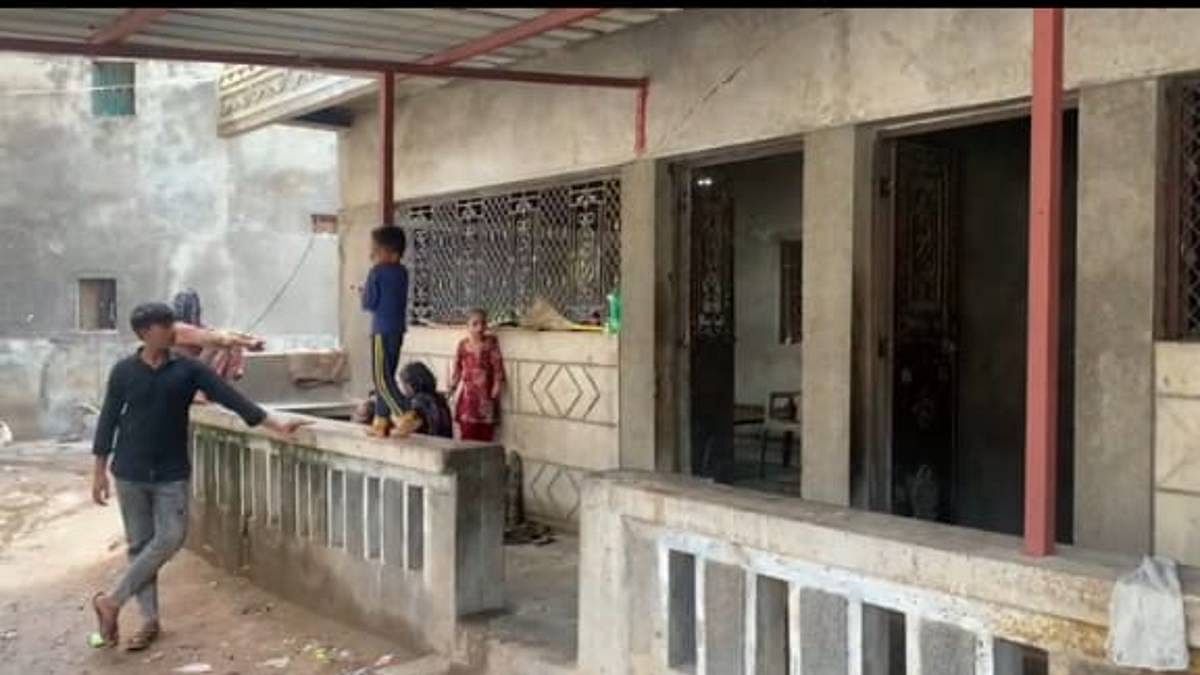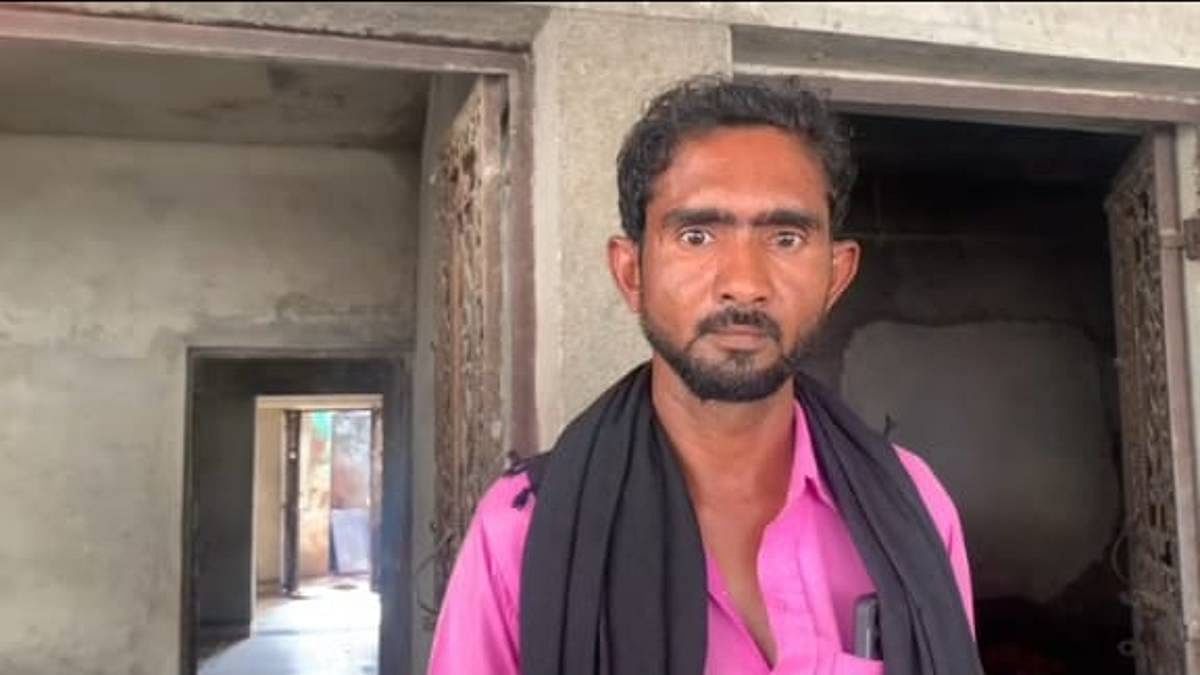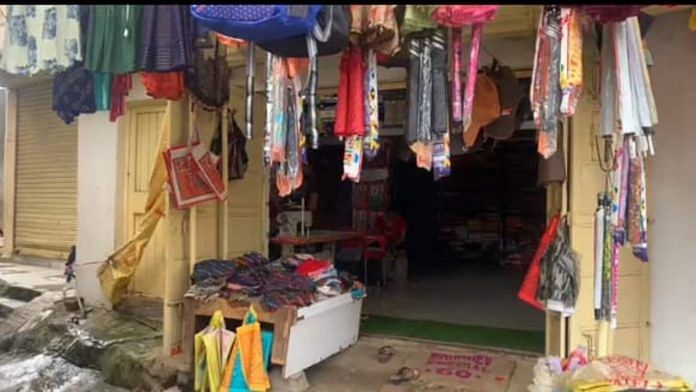Singvad: A lawyer, a teacher, a doctor, a self-styled social worker, the husband of a former sarpanch, and one who ran a hotel, are among the 11 convicts in the Bilkis Bano gang rape case — from the 2002 Gujarat riots — who have been granted remission in their life sentences by the Gujarat government, and walked out of the Godhra jail on 15 August. The remission comes in a year which will see Gujarat vote for a new assembly.
Most of the 11 who were released, returned to Singvad, a village in Gujarat’s Dahod district, which now wears a nonchalant, but uneasy calm. The village — with its pockmarked roads, mucky by-lanes, and narrow streets teeming with shops and goats— was also home to Bano’s family until 2002.
Ask about the Bilkis Bano case, and the villagers build a wall.
Rameshabhai, a fruit seller in Singvad, told ThePrint that the village has been peaceful since the 2002 Gujarat riots and “is still peaceful”.
“But, I don’t want to talk about relations between the different communities here. I keep to my business,” he added.
The few who cautiously open up, tell stories of a time when Bano’s family would supply buffalo milk to the village, the children played cricket together, people attended each others’ family functions. There was a casual exchange even between some of the convicts’ families and Bano’s household, they recall.
They also speak about minor sparring between the Hindus and Muslims of the village, every now and then.
Convicts and their kin maintain innocence, while Bano’s extended family who still live in Singvad say there’s always a cloud of anxiety over their heads.
Also read: Hindu-Muslim to basic humanity—Bilkis Bano case shows India will never be free of Nirbhayas
‘My upbringing doesn’t support what happened with Bilkis’
A mob at Gujarat’s Randhikpur village gang-raped Bano and according to the prosecution, killed fourteen members of her family — including her three-year-old daughter Saleha — while they were fleeing during the Godhra riots in March 2002.
Bano had been 19, and five months pregnant at the time.
She later named people from her village, Singvad, as the accused, 11 of whom were convicted in 2008, while one died during the trial.
The convicts and their kin, however, maintain that they were innocent, and were targeted for political reasons.
“The NGO walas at the relief camp fed this story to Bilkis. We were made a scapegoat because Modiji’s political opponents wanted to target him,” alleged Radheshyam Shah, a lawyer, who was convicted of the crime and walked out of prison on remission on 15 August.

Speaking to ThePrint over phone, Shah claimed, “Whatever happened in 2002, I don’t know who did this, but whatever happened to the family and everything that they have lost, it is wrong. My upbringing and culture don’t support this.”
He added: “But, none of us are involved in this in any manner.”
Shah, who spent two days in his village after being released from prison, traveled to neighbouring Rajasthan Thursday, to visit a temple and thank his deity for his release.
He claimed he was home with his family members on 3 March, 2002, the day of the incident, but back then with no CCTV cameras and cell phones, it was difficult to convincingly build alibis.
He offers another reason for why the group of convicts was incapable of committing the crime they were convicted for.
Among those convicted, there were three pairs of brothers — Naresh Modhiya and Pradeep Modhiya, Shailesh Bhatt and Mitesh Bhatt, Keaarbhai Vohania and Bakabhai Vohania — and an uncle-nephew pair — Jaswant Nai and Govind Nai.
“Whatever they said, that we gang-raped her one after the other, think about it from a moral point of view. Can a person do something like this with his brother right there watching? This is not our culture,” Shah claimed.
About two kilometres away from the village centre, at the house of Govind Nai — another of the now-released 11 — there was a sense of normalcy when ThePrint visited Thursday. A toddler was playing on the steps until his mother took him inside in her arms, his older brother was riding a small cycle inside the house and their grandmother was doting over both.
Govind Nai wasn’t home, while Nai’s son, who did not wish to be named, was preparing to step out.
“It is a closed chapter for us,” he said when asked about the case. “We really don’t want to talk about it. He (Govind Nai) was a teacher in a government school in a nearby village before all of this happened. Now, of course, he isn’t a teacher anymore,” he added.
Minor rivalries
Singvad residents claim Bano’s family lived peacefully in the village until 2002, though some recall minor bickering with other residents now and then — the kinds which is not uncommon between neighbours, they clarify.
Many of the convicts used these reasons as suggestions for why they may have been “implicated”.
For instance, according to court records, Nareshkumar Modhiya ran a hotel in the village and he suggested in court that he may have been targeted because there were complaints of the drainage water from the hotel running into Bano’s father’s courtyard. Modhiya died while in prison.

Another convict, Bipin Joshi, known in the village as Lala Doctor, supposedly treated Bano’s father, but he did not pay for the medicines. Joshi’s unkempt house at Singvad has been empty for years. Villagers said, a few years after his arrest, his family moved to Vadodara.
Ramesh Chandana, also among the 11, who had been a government clerk, had suggested in court that his campaigning against a sitting sarpanch may have gone against him. Chandana’s wife eventually become sarpanch of the village in 2001.
According to court documents, Shailesh Bhatt, a third convict, was a “social worker” who had taken initiative in razing illegal structures, many of which belonged to Muslims. Bhatt is now hard of hearing and cannot hold a conversation, people in Singvad said.
Bhatt had also defeated an incumbent Muslim sarpanch to become the head of the village, Radheshyam Shah said.
Talking about himself, he claimed he may have also been “targeted“ because as a lawyer in 1998 he had campaigned to “bring back two tribal girls taken away by Muslim men”.
Shah, however, maintains that he is not connected with any political party or organisation and visuals showing the convicts being welcomed with sweets and celebrations by Hindutva outfits are half-truths.
“Yes, our friends and family who know us did greet us with aarti and sweets. We were meeting them after very long. But, there was a lot of confusion on our release. There were many people who we didn’t know, and they gave us bouquets and garlands and pedhas (sweets). It also started raining,” he said.
“The jail superintendent had told us to leave as swiftly as possible as our case was sensitive and we were focusing on that. But, there was a lot of crowding and confusion,” he said.
‘We live in fear’
Before the family fled Singvad (during the riots), Bano’s father, Abdul Ghachi, ran a business, supplying buffalo milk in the village. A few years after the 2002 incident, Ghachi leased his house to “some people from outside the village” to run a garment shop, Ghachi’s relatives and acquaintances who are still in Singvad told ThePrint.
Behind the shop is a bare grey house where Bano’s uncle, Ayyub, still lives with his family.
While Ayyub wasn’t home, his nephew, Bano’s cousin, Ismail Ghachi, told ThePrint that they have been scared ever since the convicts have been released.

“Earlier too, when some of them would come on parole, we would be scared. There were some minor fights. We are living in fear now that they have been released,” Ismail said, claiming that he was among the prosecution witnesses during the trial.
He also claimed that while Bano did get the Rs 50 lakh compensation that the Supreme Court had directed the Gujarat government to pay in 2019, the family is still awaiting the promised permanent accommodation and a government job.
He also said post-2002, the Muslim community in the village has dwindled. Most people like him live in other villages and only come to Singvad for work during the day.
Several villagers meanwhile told ThePrint that Ayyub, referred to as Bodha kaka by many in the village, often sits at a tea stall near his house, which is right opposite the residence of Radheshyam Shah.
While Ismail Ghachi said they did not maintain any relations with the families of convicts, Shah’s family paints a different picture.
“We have cordial relations with Bodha kaka. He has chai at a stall right opposite our house. We have known their (Bilkis Bano’s) family for years. There is complete peace among Hindus and Muslims. On independence day too, when there was a tiranga yatra, both communities participated,” said 45-year-old Ashish Shah, Radheshyam’s younger brother, who manages the family’s shop that sells bangles, bracelets, earrings, and sundry other items.
He recalls how he and his brother would play cricket with Bano’s brother.
“We used to drink the milk that came from them. We have had food at each other’s houses during functions and celebrations,” 80-year-old Bhagwandas Shah, Radheshyam’s father, told ThePrint.
“I too have daughters. I know their pain. Back then, the mahaul (ambience) was bad. But, my son is innocent,” he said, adding, “We waited for 18 years, six months, and 33 days for his release.”
(Edited by Poulomi Banerjee)
Also read: Bilkis Bano case convicts controversy: Why the 11 were released under ‘old’ 1992 policy



